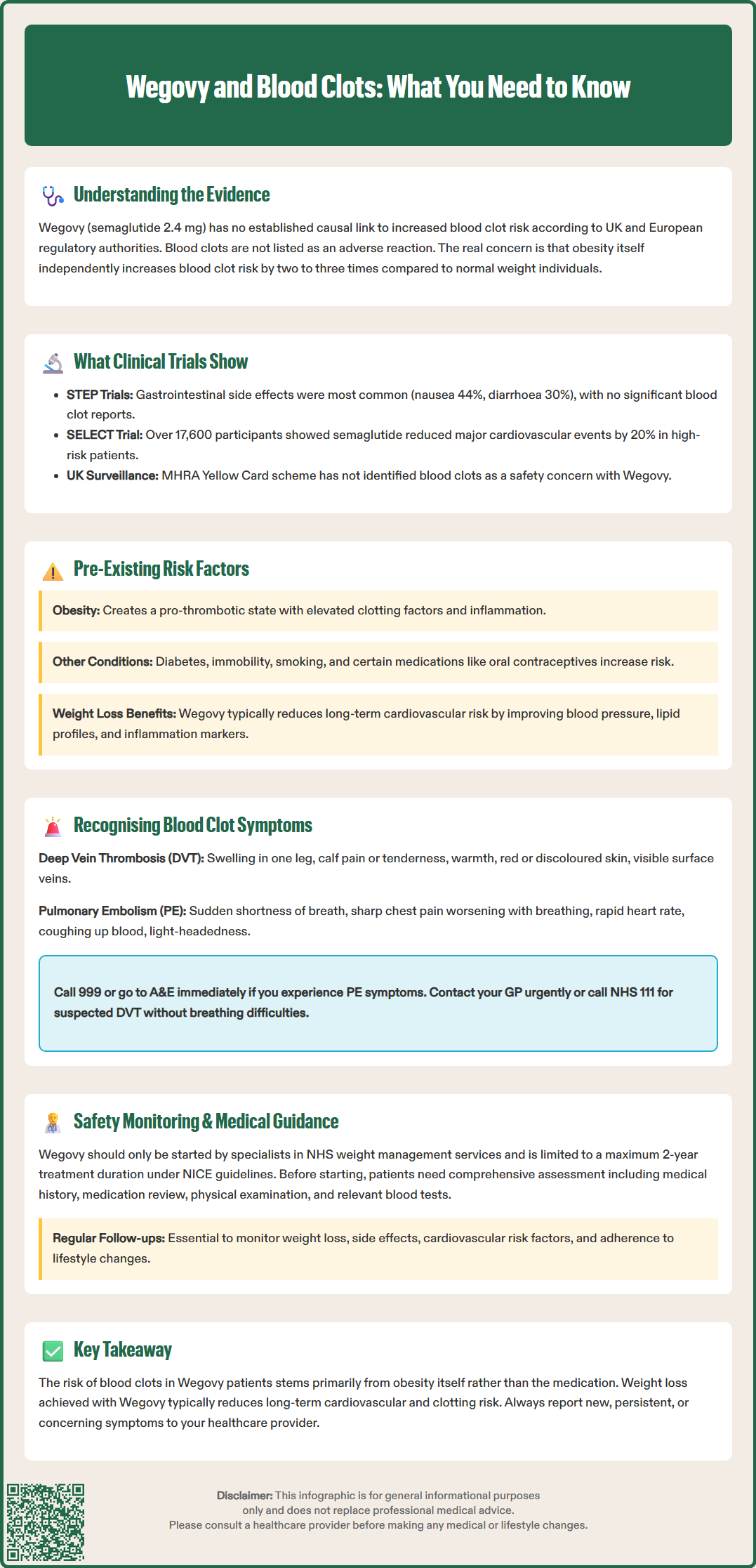
Wegovy (semaglutide 2.4 mg) is a GLP-1 receptor agonist licensed in the UK for weight management in adults with obesity or overweight with weight-related comorbidities. Many patients and healthcare professionals ask whether Wegovy increases the risk of blood clots. According to the UK Summary of Product Characteristics and European Medicines Agency assessment, there is no established causal link between Wegovy and blood clots. However, obesity itself independently increases venous thromboembolism risk two to three-fold. Understanding the distinction between medication-related effects and pre-existing risk factors is essential for safe prescribing and informed patient decision-making.
Quick Answer: There is no established causal link between Wegovy (semaglutide) and an increased risk of blood clots according to UK regulatory data and clinical trials.

Mounjaro® is the most innovative GLP-1 medication proven to dramatically curb appetite, hunger, and cravings to help professional men achieve substantial weight loss.
Start Here
Wegovy® is a weekly injectable GLP-1 medication with proven effectiveness in reducing appetite, hunger, and cravings to help busy professionals lose significant weight.
Start HereWegovy (semaglutide 2.4 mg) is a glucagon-like peptide-1 (GLP-1) receptor agonist licensed in the UK for weight management in adults with obesity or overweight with weight-related comorbidities. As with any medication, patients and healthcare professionals naturally have questions about potential adverse effects, including whether Wegovy increases the risk of blood clots (venous thromboembolism or VTE).
According to the UK Summary of Product Characteristics (SmPC) and European Medicines Agency (EMA) assessment report, there is no established causal link between Wegovy and an increased risk of blood clots. Blood clots are not listed as an adverse reaction in the SmPC, and were not identified as a significant safety signal in the pivotal STEP clinical trials, although these studies were not specifically powered to detect differences in rare thrombotic events.
However, it is important to recognise that obesity itself is an independent risk factor for venous thromboembolism. According to NICE guideline NG158, patients with a body mass index (BMI) over 30 kg/m² have approximately two to three times higher risk of developing blood clots compared to individuals with normal weight. This baseline risk means that people prescribed Wegovy may already have elevated thrombotic risk due to their weight status, rather than the medication itself.
Understanding the distinction between medication-related adverse effects and pre-existing risk factors is crucial for informed decision-making. This article examines the clinical evidence, explores cardiovascular considerations, and provides guidance on recognising symptoms and maintaining safety during Wegovy treatment.

The evidence base for Wegovy's safety profile comes primarily from the STEP (Semaglutide Treatment Effect in People with obesity) clinical trial programme, which evaluated semaglutide 2.4 mg in diverse populations over 68 weeks. Across these trials, venous thromboembolism was not reported as a common or significant adverse event. According to the STEP 1 trial published in the New England Journal of Medicine (2021) and the Wegovy SmPC, the most frequently reported side effects were gastrointestinal in nature, including nausea (44%), diarrhoea (30%), and vomiting (24%).
A comprehensive cardiovascular outcomes trial, SELECT (Semaglutide Effects on Heart Disease and Stroke in Patients with Overweight or Obesity), published in 2023, demonstrated that semaglutide reduced major adverse cardiovascular events by 20% in high-risk patients. This trial followed over 17,600 participants for more than three years and focused on cardiovascular outcomes rather than venous thromboembolism specifically. The cardiovascular benefits observed relate to major adverse cardiovascular events (MACE) rather than venous thrombotic disease.
Post-marketing surveillance data collected by the MHRA through the Yellow Card scheme has not identified blood clots as a pattern of concern with Wegovy to date. While individual case reports may exist, these do not establish causation, as patients taking Wegovy often have multiple risk factors for thrombosis independent of the medication.
The mechanism of action of semaglutide—enhancing insulin secretion, suppressing glucagon, and slowing gastric emptying—has no established effect on coagulation parameters according to the SmPC and regulatory assessments. This provides biological plausibility for the absence of a direct thrombotic risk signal in clinical trials.
When assessing thrombotic risk in patients prescribed Wegovy, it is essential to consider baseline cardiovascular and thrombotic risk factors rather than attributing risk solely to the medication. Obesity is associated with a pro-thrombotic state characterised by elevated fibrinogen, increased plasminogen activator inhibitor-1 (PAI-1), and chronic low-grade inflammation—all of which contribute to clot formation.
Key risk factors for venous thromboembolism that may be present in patients considering Wegovy include:
Obesity (BMI >30 kg/m²) – independently doubles to triples VTE risk
Immobility or reduced physical activity – common in individuals with severe obesity
Type 2 diabetes – associated with endothelial dysfunction and hypercoagulability
Previous history of blood clots – significantly increases recurrence risk
Smoking – damages blood vessels and increases clotting tendency
Certain medications – including combined oral contraceptives or hormone replacement therapy
Recent surgery or prolonged hospitalisation
Active cancer or cancer treatment
Pregnancy and postpartum period
Prolonged travel (especially long-haul flights)
Before initiating Wegovy, healthcare professionals should conduct a thorough cardiovascular assessment. According to NICE Technology Appraisal 875 (TA875), Wegovy should only be prescribed within specialist weight management services in the NHS, with treatment limited to a maximum of 2 years. This includes evaluating personal and family history of cardiovascular disease, assessing modifiable risk factors, and considering whether additional thromboprophylaxis might be indicated in high-risk situations (such as upcoming surgery) in line with NICE guideline NG89 on VTE prophylaxis.
Importantly, the cardiovascular benefits of weight loss achieved with Wegovy typically outweigh theoretical concerns. Studies demonstrate that sustained weight reduction improves blood pressure, lipid profiles, glycaemic control, and inflammatory markers—all of which reduce long-term cardiovascular risk. Patients should be counselled that successful weight management is likely to decrease rather than increase their overall risk of blood clots over time.
Whilst there is no established link between Wegovy and blood clots, patients should be educated about the signs and symptoms of venous thromboembolism as part of comprehensive safety counselling. Early recognition and prompt medical attention are crucial for optimal outcomes should a blood clot occur for any reason.
Symptoms of deep vein thrombosis (DVT) typically affecting the legs include:
Swelling in one leg (rarely both)
Pain or tenderness, often starting in the calf
Warmth in the affected area
Red or discoloured skin
Visible surface veins
Symptoms of pulmonary embolism (PE), a potentially life-threatening complication when a clot travels to the lungs, include:
Sudden shortness of breath or difficulty breathing
Sharp chest pain that may worsen with deep breathing or coughing
Rapid heart rate or palpitations
Coughing up blood
Feeling lightheaded or fainting
Unexplained anxiety or sense of impending doom
Patients should seek immediate medical attention (call 999 or attend A&E) if they experience symptoms suggestive of pulmonary embolism. For suspected DVT without breathing difficulties, patients should contact their GP urgently for same-day assessment in line with NICE guideline NG158, or call NHS 111 if unable to access their GP. They may be referred to an Urgent Treatment Centre or hospital for further evaluation.
It is equally important to recognise symptoms that may be common side effects of Wegovy rather than signs of serious complications. Nausea, abdominal discomfort, and fatigue are frequent, particularly during dose escalation, and do not indicate blood clots. However, any new, persistent, or concerning symptoms warrant medical review. Patients should never hesitate to seek advice if uncertain, and healthcare professionals should maintain a low threshold for investigation when clinical suspicion exists, regardless of medication history.
Appropriate patient selection and ongoing monitoring are fundamental to safe Wegovy prescribing. NICE Technology Appraisal 875 (TA875) specifies that in the NHS, Wegovy should only be initiated by healthcare professionals within specialist weight management services, and treatment is limited to a maximum of 2 years.
Before starting treatment, a comprehensive baseline assessment should include:
Medical history review – including cardiovascular disease, previous VTE, and thrombotic risk factors
Medication review – identifying potential drug interactions or medications affecting coagulation
Physical examination – including blood pressure, heart rate, and BMI
Laboratory investigations – as clinically indicated, potentially including lipid profile, HbA1c, and renal function
During treatment, patients should attend follow-up appointments according to local specialist service protocols to monitor:
Weight loss progress and metabolic improvements
Tolerability and adverse effects
Cardiovascular risk factor modification
Adherence to lifestyle interventions
Patients should be counselled to report any new symptoms promptly and maintain open communication with their healthcare team. According to the Wegovy SmPC, patients should be particularly alert to symptoms of pancreatitis (severe abdominal pain, sometimes radiating to the back, with or without vomiting) and gallbladder disease. People with diabetes should have appropriate retinopathy monitoring, and all patients should be aware that Wegovy may increase heart rate.
For patients with additional thrombotic risk factors, individualised risk-benefit assessment is essential. This might include those with previous VTE, inherited thrombophilias, or upcoming surgery. In such cases, consultation with relevant specialists (haematology, vascular medicine) may be appropriate. However, the presence of risk factors does not automatically contraindicate Wegovy use; rather, it necessitates enhanced vigilance and potentially additional preventive measures.
The Yellow Card scheme (yellowcard.mhra.gov.uk) allows both healthcare professionals and patients to report suspected adverse reactions to the MHRA, contributing to ongoing pharmacovigilance. Whilst current evidence does not support a link between Wegovy and blood clots, continued post-marketing surveillance remains important for detecting rare or delayed adverse effects. Patients can report suspected side effects directly via the Yellow Card website or app, empowering them to contribute to medication safety monitoring.
No, there is no established causal link between Wegovy and blood clots according to UK regulatory data, the Summary of Product Characteristics, and clinical trial evidence. Blood clots were not identified as a significant safety signal in the STEP clinical trials.
Obesity itself is an independent risk factor for venous thromboembolism, increasing risk two to three-fold compared to normal weight. Patients prescribed Wegovy may have elevated baseline thrombotic risk due to their weight status and associated comorbidities, rather than the medication itself.
Seek immediate medical attention (call 999) for symptoms of pulmonary embolism including sudden shortness of breath, sharp chest pain, rapid heart rate, coughing blood, or feeling faint. For suspected deep vein thrombosis with leg swelling, pain, warmth, or redness, contact your GP urgently for same-day assessment.
All medical content on this blog is created based on reputable, evidence-based sources and reviewed regularly for accuracy and relevance. While we strive to keep content up to date with the latest research and clinical guidelines, it is intended for general informational purposes only.
DisclaimerThis content is not a substitute for professional medical advice, diagnosis, or treatment. Always consult a qualified healthcare professional with any medical questions or concerns. Use of the information is at your own risk, and we are not responsible for any consequences resulting from its use.